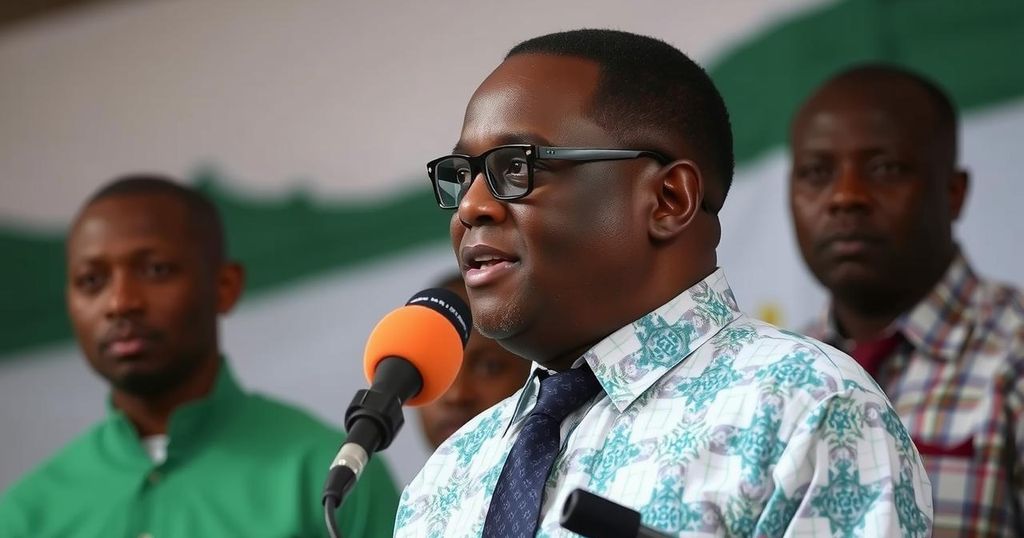Ghana’s Upcoming Elections: A Contest of Vision Between Mahama and Bawumia

Ghana’s December 7 elections feature former President John Mahama challenging current Vice President Mahamudu Bawumia in a highly competitive landscape. Mahama promises a 24-hour economy to address job creation amidst a backdrop of economic recovery from significant debt issues, while Bawumia pledges ongoing economic strengthening. Voter sentiments indicate desires for change, with minor parties and independent candidates also impacting the electoral dynamics.
The upcoming national elections in Ghana, scheduled for December 7, are anticipated to be fiercely competitive, prominently featuring former President John Mahama as a significant challenger against the ruling party’s candidate, Mahamudu Bawumia. Mahama has pledged to foster an environment conducive to 24-hour business operations aimed at boosting job creation and revitalizing an economy straining under the weight of a $30 billion external debt default in 2022. In contrast, Vice President Bawumia, who acknowledges the challenges stemming from the aftermath of the COVID-19 pandemic and internal issues, asserts his commitment to economic recovery.
Since 1992, Ghana’s political paradigm has predominantly revolved around the National Democratic Congress (NDC) and the New Patriotic Party (NPP). According to Kwame Asah Asante, a senior lecturer at the University of Ghana, the landscape is unlikely to change dramatically. “It’s the dominant parties; one of them is going to carry the day… minor parties have not gone up to 5%” in past elections. Nevertheless, the minor parties could disrupt the election dynamics if they galvanize sufficient support, potentially forcing a runoff.
The vibrancy of the electoral atmosphere is palpable in Accra, with numerous billboards adorning the streets. Many citizens express their desire for a change from the established political norm. “Since 1992 to this year, we haven’t changed parties … every day it’s NPP NDC … we want [to] change to [a] different party so that we would see more improvements,” stated undecided voter Angela Ofori. Emerging candidates, such as independent aspirant Nana Kwame Bediako, also known as Cheddar, aim to resonate with the youth but have yet to achieve significant traction, despite Bediako’s focus on eco-friendly policies and improving daily life for Ghanaians.
The economic landscape in Ghana is delicate. The country, recognized as the second largest cocoa producer globally, suffered a setback with its 2022 debt default, exacerbated by the residual effects of the global pandemic and the ongoing crisis stemming from the war in Ukraine, which has disrupted grain supplies. Asante highlighted crucial issues such as infrastructure, healthcare, and corruption that are pivotal for voters, with the economy taking center stage. “The economy will play an important role because it’s a bread-and-butter issue… anytime you have a very difficult economy, campaigning becomes difficult for the government of the day,” he said.
This sentiment is mirrored by John Taden, an international political economist, emphasizing the impact of inflation on voter sentiment. Illegal mining, locally referred to as “galamsay,” poses an additional challenge, threatening agricultural productivity and the environment, particularly for cocoa production.
Many individuals express disillusionment with the current administration and seek change through Mahama’s vision of a round-the-clock economy. In contrast, others commend the ruling NPP, attributing the success of policies such as digitization to Bawumia’s initiatives. Ivan Duke, an NPP supporter, remarked, “One policy I am very happy about is the digitization policy. … This policy is about creating jobs online, making everything more accessible.”
In summary, while Ghana is recognized as a stable democracy amidst a tumultuous regional context, the forthcoming elections are poised to be closely contested, with pressing economic concerns and public dissatisfaction driving voter sentiment.
Ghana’s political arena has been dominated by two main parties, the National Democratic Congress (NDC) and the New Patriotic Party (NPP), since the country’s return to multi-party democracy in 1992. The upcoming elections are historic, reflecting the citizens’ desire for meaningful change amidst economic challenges, particularly following the significant debt crisis experienced in 2022. Voter sentiments reveal a potential shift, with emerging independent candidates also seeking to engage the electorate, particularly the youth, in the political discourse. Given the current economic backdrop, especially inflation and the repercussions of illegal mining, the priorities of the voters are likely to shape the election’s dynamics significantly.
The December 7 elections in Ghana are set to be highly competitive, driven by public discontent with the economic situation and a desire for change within the political framework. Former President John Mahama aims to capitalize on these sentiments with promises of job creation and economic revitalization, while Vice President Mahamudu Bawumia defends the ruling party’s legacy. As minor parties and independent candidates vie for attention, the electorate’s concerns regarding economic stability and effective governance will be central to the upcoming electoral outcome.
Original Source: www.voanews.com








